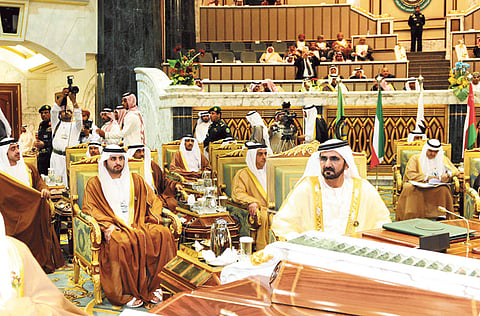GCC moving in right direction
Proposal for a Gulf union is in line with the spirit of the age, which calls for creation of big blocs

The Gulf Cooperation Council (GCC) summit, which concluded in Riyadh on Tuesday with a call for a Gulf union, is expected to constitute a qualitative leap for joint action on many levels.
Surprisingly, there were moves towards shifting the Gulf council from the stage of cooperation to union. And this was widely welcomed by the six Gulf nations.
By making this historic call, GCC leaders have sent several messages. The most important is that the bloc is inseparable, and is determined to push ahead with its plans towards complete integration and creation of a powerful entity that is equal to other blocs in the world. This move is in line with the spirit of the age and rapid global changes which call for the creation of big blocs to tackle present world realities. Another message is that GCC countries are determined to achieve economic unity, especially with regard to the common market, single currency and unification of economic policies. This, in order to improve the living standard of Gulf citizens, and create an economic entity capable of realising more gains in international economic relations.
GCC leaders also made it clear that countries that viewed the differences in GCC stances as a chance to interfere in their domestic affairs must reconsider their decision. This is simply because GCC security and military integration is inevitable and is something that will never be neglected. Regarding the shift from the stage of cooperation to the call for a union, the summit's final communiqué made it clear that GCC states are seeking to create societies based on equality, in which women enjoy a social status compatible with their contributions to development. This move will stop those who try to destabilise any GCC country by inciting sectarian or tribal extremism that would hinder development.
The fifth message is that the western part of Arabian Gulf is almost united — thus contributing to stability in the entire region.
As Gulf citizens, we look forward to this expected shift that has been widely welcomed by all of us, as it would be good for the future. We believe this move will contribute to preserving our interests and gains that were achieved following immense efforts. The move will also herald a better future for the younger generations.
What makes one optimistic is that the proposal to move from cooperation to union was made collectively. It also differs from previous proposals, in that it sets a specified timetable for implementation. A committee composed equally of members from the six GCC states will be formed, and the states shall designate their respective members no later than February 1, 2012. It will submit its recommendations in March to the Ministerial Council, which will examine them further before submitting the final recommendations to the Consultative Meeting of the GCC leaders in May 2012.
Positive results
This is clear evidence that the GCC leaders are serious about this proposal unlike the previous ones. And, if it is implemented properly and in a timely fashion, there will be many positive results, while avoiding negative ones.
This approach will put the GCC countries on the path towards development within the course of normal evolution agreed upon by their leaders and people.
Everyone, whether government or individuals, knows that there is no ideal society, or utopia except in the mind of utopians. Gulf societies, like other societies in the world, are striving towards advancement but face obstacles. But ultimately they are moving in the direction of economic and social growth at a good rate. Even more, GCC countries do not hesitate to stand by emerging countries, and have set a good model of development for developing countries in the world. In the meantime, educational, health and housing services have developed, coupled with the expanding scope of women's participation in public life as they now occupy leading and high-profile positions.
Furthermore, civil society organisations are now playing a bigger role in GCC countries, a role that has been highlighted in the summit's communiqué. This move would block interventions by foreigners and their attempts to export armchair ideologies. In short, it is obvious that GCC countries are moving in the right direction, and will achieve their aspirations, common interests, stability and sustainable development.
Dr Mohammad Al Asoomi is a UAE economic expert and specialist in economic and social development in the UAE and the GCC countries.



